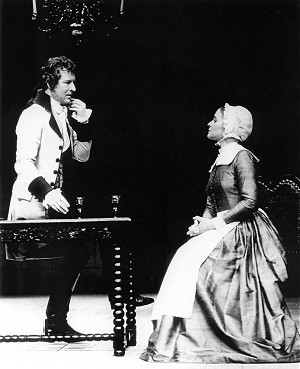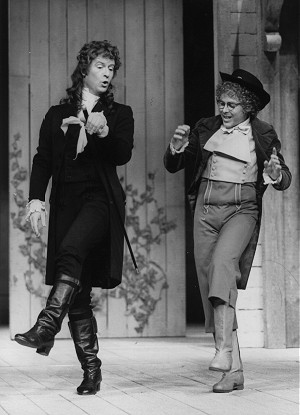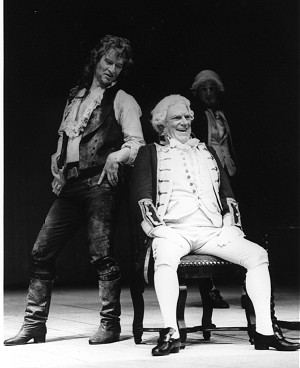

|
A funny thing happened to Alan Howard on stage the other night. It was one of those mad moments that make memories. As he lunged forward to kiss the pretty squire's daughter in the Royal Shakespeare Company's smash hit 'Wild Oats,' a loud searing sound rent the air. "I thought at first it was her petticoats ripping," he said later. When he stood up he brought the house down. His trousers - to his horror - had come adrift "from knee to crutch" down one leg and with much of the scene left to play there was no hiding it. And if these circumstances were not hilarious enough, his next line was "I must away and divert myself." But professional down to his underpants he quickly turned it to his advantage. The next few ludicrous moments were pure ad lib though some of the audience are still wondering......... On his first exit the wardrobe mistress did a quick "crochet job" up the offending inside leg and, by the time the interval was over, Howard's dignity and body were totally recovered. |
|
|
Howard tells this story against himself - one which for all its horrors - he finds hugely funny. But lasting memories of Alan Howard on stage are made of sterner stuff. At 41 he is arguably the greatest Shakespearean actor of his day. He collects awards like other people collect stamps. |
Now in peak condition he has won four Actor of the Year awards in the last three years, twice over in 1978.
To avid theatre buffs he can do little wrong, acclaimed by his profession, critics and audience alike. Yet he is still relatively unknown outside the stage door.
His 'Coriolanus' is widely regarded as a definitive performance. The erudite Bernard Levin was moved to remark: "He made me understand 'Coriolanus' like never before." And a source not a million miles away from the Extra desk reckoned that if she never saw another play, she was privileged to have clapped eyes on this one.
And yet this deeply committed actor who invariably has critics reaching for the superlatives - "flawless performance," "dazzling virtuosity," "stunningly brilliant," - admits to being frequently unnerved. He talks of every performance as a minor car crash, which worsens on first nights, gets "very frightened" at the thought of public speaking and says interviews are like exams to him. After talking to the press he goes away and thinks about it, "I always feel I've said the wrong things." He gets embarrassed reading about himself, preferring someone else to read through first.
Perhaps his most outstanding achievement to date has been his tackling of three name lead roles simultaneously. 'Henry V', 'Henry VI' (parts 1, 2 and 3) and 'Coriolanus', five plays in all. This marathon feat was seen in Newcastle last season.
This year Howard returned to the Newcastle stage in a revival of a hitherto unknown play, 'Wild Oats', by O'Keefe. It was the first major play of the RSC season to sell out. Significantly it was also Howard's only appearance in the North-East this season.
|
Newcastle holds special delights for Howard, and he is fascinated by the Geordie accent, the broader the better. "For some reason it's a very strong audience here. It's very, very exciting. I always remember my parents and older relatives who were actors saying it was always good playing in Newcastle." A fine performance, he tells you, is a dialogue, a ballgame between actors and audience. And, in his view, the conversation is first rate here. He agrees with director Barry Kyle that some of the company's best performances happen on our doorstep. An only child of two actors, young Alan was not encouraged to follow in the family footsteps. "They tried to warn me off saying we don't need any more in the business." Leslie Howard was his uncle. But thanks to two inspiring eccentric English teachers, he followed his instincts and British theatre is the richer. At the tender age of six-and-a-half he was packed off to boarding school. His father was at war and "mother was trying to be an actress." His first taste of the Bard was through the annual school play. "The first role I ever played was Celia in 'As You Like It'. I was dreadful," he recalls. "At about 16 or 17, I played Autolycus in 'The Winter's Tale'. I think I was quite good. I asked some of my family to come along and tell me if they thought I was any use. We do think you're quite good, they said, but we don't think you should go on stage. Then I knew I wasn't totally misguided." |
 |
At 20, he was taken on at the Belgrade Theatre, Coventry...... "Very green and enthusiastic" as general dogsbody. "I was called general stage assistant which meant we had to do everything." He progressed rapidly through assistant stage manager to bit part player and leading man. In the early Sixties there was the repertory round - Royal Court, Mermaid, Nottingham, Chichester and "bits on the telly." In 1966 he joined the RSC where he has been on and off ever since. It's been the making of him. "It's a marvellous place to work."
He recalls with relish a world tour when he managed to get into Burma for 10 days and visit Rangoon, Manderlay and Pagan's 1500 temples. After Newcastle he packs his bags again when the RSC takes 'Coriolanus' to Europe. The six weeks tour taking in major capitals presents "a tight schedule, which could be murderous."
|
But for all the travel, Howard is happiest when his family is with him. Increasingly so. He shares his London home with journalist Sally Beauman and their small son who rejoices in the name of James Carlos Alexis Mackenzie Howard. Young James is a seasoned theatre-goer. He's nearly four. When he was two-and-a-quarter, says his father, he came to see 'Wild Oats'. "He was very good until the closing Ages of Man speech. Just at the line about the infant mewling and puking James started to scream. Right on cue. It brought the house down." At the age of three he saw 'Coriolanus'. "He was fazed by the ending when I'm carried off dead and minutes later walk on for the curtain call. Afterwards he asked me, 'were you dead?' I explained I was just pretending. This has given him carte blanche to get out of every situation. When he's playing with his dinosaurs, for example, they have great fighting scenes and his language can get dreadful. When we say James you mustn't say that he comes back with, 'I'm not saying it, I'm just pretending.........' " Pressed, Howard will admit he is a family man. Never having had brothers or sisters himself - "In a way I wish I had. It's one relationship I'll never know" - he is keen to give his son that chance. "Another one maybe." |
 |
What's he like to live with mid-season? "About as bad as Sally when she's behind her writing deadline," he says.
Howard brings to the stage some rare gifts which he exploits ruthlessly to get the desired effect. Together they lend him a chameleon-like versatility that opens up a thousand possibilities.
|
On stage his presence is magnetic. Witness his posturing Jack Rover, the irresistible dandy, or the hero king Henry V. Yet equally he can shed it as a cloak, and so convince as the lily-livered weakling Henry VI. Even more uncanny is his knack of appearing physically different. Slope shouldered and slight as the weedy Henry VI and tall and well proportioned as the larger than life Jack Rover. Then there's the voice. The Howard vocal cords are like his favourite specs, steel edged. His voice has a metallic ring that can change gear from a bark to a whine, or a rasp, and in the next breath seduce with honeyed sweetness. His love affair with the English language in general and Shakespeare in particular enables him to delve deep and find new ways with familiar words. Off stage he likes talking. "I spend most of my time doing that," and it's the nearest he comes to a hobby. Words tumble out one minute and are hard to find the next. He talks earnestly, chewing on his cigarette holder and tugging his hair, fixing you with a direct gaze, then pausing and addressing the floor or the table as he pursues those words which exactly express his thoughts. Easy answers are not his currency. He thinks before he speaks. Which makes for a stimulating conversation. |
 |
His constant digging for the truth of the matter consumes him with questions. There is a hefty dose of the non-conformist in him which leads him to challenge accepted ideas ........... on marriage, education, the teaching of Shakespeare in school.
The pressure to fit into neat conformist moulds, he feels, begins at school. "I suppose it makes people easier to govern and their needs catered for, but I'm not sure it makes them happier." And again: "What Shakespeare has confirmed for me is that we are essentially contradictory by nature which is not a bad thing to understand. If we try not to contradict ourselves we eliminate the possibilities in life." Which is the trouble with much of our society.
Marriage is another subject he feels strongly about. Both he and Sally have been married before, which he feels explains why they are in no hurry now. "If you don't happen to subscribe to the Church it is rather pointless, isn't it?" Originally a Catholic, his schooldays were High Anglican in influence. He attended chapel 10 times a week.
Today he is come full circle. "I'm on my own now."
"I can see where children are concerned marriage is an adequate arrangement. But if two people are honouring their relationship there should be no need for a piece of paper. Children are just as well looked after. Anyway, just because someone's married, who's to say the father's the father anyway? It's just a legal property deal."
Talking of which....... "I'm a putative father," he says with amusement. "Ridiculous, isn't it? When I went to the hospital when James was born they found it difficult to know how to regard me."
Another subject close to the Howard heart is education. "Do you know, by the time James is five, we HAVE to send him to school. What for? To cram him full of what? So he can pass exams and come out at the end of it without a job? If a child should decide to learn all about flowers in the British Isles, say, why shouldn't he? That in itself opens up whole new worlds. Why can't we be educated when we want to at whatever time we choose?"
If Howard has his way, we can look forward to his Othello, Macbeth and Lear in due course. Roles which he wants to tackle sometime. But not yet. When he does, he will be following in the footsteps of his heroes ...... "most of the knights, Richardson, Olivier, Scofield" ...... It is surely just a matter of time before he joins their royal ranks.
Feona McEwan
Newcastle Evening Chronicle, 27.2.79. (Family Extra)
(M.H.)